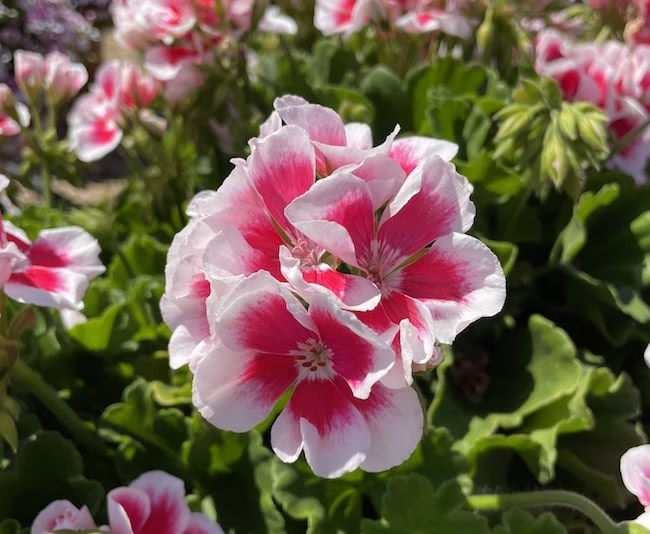
White Splash Geranium
Botanical Name
:
Pelargonium zonale
Plant Type
:
Annual, vegetative
Seasons
:
Spring, Summer, Fall
Sun Level
:
6–8 hours of direct sunlight per day.
Ideal Soil Temperature for Planting
:
65–75°F (18–24°C)
Soil Type
:
Well-drained soil; can thrive in various soil types like chalk, clay, loam, or sand.
Germination
:
Propagated through cutting, seeds take 7–14 days to germinate.
P.H. Level
:
6.0–7.0
Water/Irrigation
:
Moderate watering and allow soil to dry slightly between waterings. As they mature, they become dry tolerant.
Fertilization
:
Apply a balanced liquid fertilizer every 2–-4 weeks during the growing season
Habit
:
Bushy, mounding
Final Plant Height
:
12–18 inches (30–45 cm)
Spread
:
12–24 inches (30–60 cm)
Spacing
:
12–18 inches (30– 45 cm)
Flowers
:
Clusters of white flowers with delicate pink or purple splashes and veining.
Attracts
:
Butterflies, bees, and other pollinators.
Uses
:
Containers, hanging baskets, garden borders, and window boxes.
Companions
:
Marigolds, petunias, salvia, lobelia
Pruning
:
Deadhead regularly after blooming. Prune back stems by about one-third after flowering season ends to encourage new growth and prevent legginess.
Toxicity
:
Mildly toxic to pets if ingested.
Pests
:
Aphids, whiteflies, spider mites, and caterpillars.
Diseases
:
Susceptible to powdery mildew, rust, and bacterial leaf spot.
Botanical Name
:
Pelargonium zonale
Plant Type
:
Annual, vegetative
Seasons
:
Spring, Summer, Fall
Sun Level
:
6–8 hours of direct sunlight per day.
Ideal Soil Temperature for Planting
:
65–75°F (18–24°C)
Soil Type
:
Well-drained soil; can thrive in various soil types like chalk, clay, loam, or sand.
Germination
:
Propagated through cutting, seeds take 7–14 days to germinate.
P.H. Level
:
6.0–7.0
Water/Irrigation
:
Moderate watering and allow soil to dry slightly between waterings. As they mature, they become dry tolerant.
Fertilization
:
Apply a balanced liquid fertilizer every 2–-4 weeks during the growing season
Habit
:
Bushy, mounding
Final Plant Height
:
12–18 inches (30–45 cm)
Spread
:
12–24 inches (30–60 cm)
Spacing
:
12–18 inches (30– 45 cm)
Flowers
:
Clusters of white flowers with delicate pink or purple splashes and veining.
Attracts
:
Butterflies, bees, and other pollinators.
Uses
:
Containers, hanging baskets, garden borders, and window boxes.
Companions
:
Marigolds, petunias, salvia, lobelia
Pruning
:
Deadhead regularly after blooming. Prune back stems by about one-third after flowering season ends to encourage new growth and prevent legginess.
Toxicity
:
Mildly toxic to pets if ingested.
Pests
:
Aphids, whiteflies, spider mites, and caterpillars.
Diseases
:
Susceptible to powdery mildew, rust, and bacterial leaf spot.

